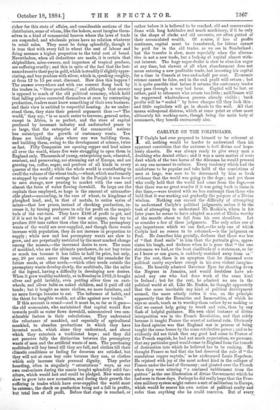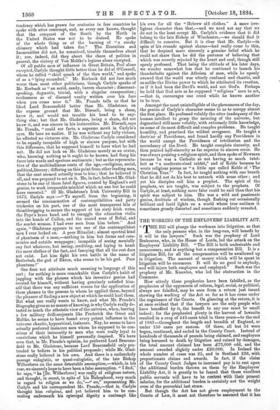CARLYLE ON THE POLITICIANS. T E , Carlyle had ever proposed to
himself to be coherent at all, nothing would be harder to understand than his apparent conviction that the universe is both divine and hope- lessly chaotic. He was always ready to give every man a drubbing who denied either; and it was a mere matter of acci- dent which of the two horns of the dilemma he would proceed at any one moment to enforce. Every tendency which had the misfortune to be popular and take hold of the convictions of men at large, was sure to be denounced by him as fresh evidence that the world was going to the dogs ; and yet those who really held that the world had come from the dogs,—so that there was no great wonder if it was going back to them in due time,—were treated with no less contempt than those who held that it was working out gradually the purpose of a Divine wisdom. Nothing can exceed the difficulty of attempting to understand Carlyle's political judgments, unless it be the task of attempting to understand Mr. Ruskin's, whom in his later years he seems to have adopted as a sort of Elisha worthy of the mantle about to fall from his own shoulders. Let us consider a few of these judgments. The only sober one of any importance which we can find,—the only one of which Carlyle had no reason to be ashamed,—is the judgment on Peel. He describes him genially, declares that there was less of "that fixed smile" in him than the portraits give, appre- ciates his laugh, and declares when he is gone that "the one statesman we had, or the least similitude of a statesman, so far as I know or can guess, is suddenly snatched away from us." For the rest, there is no symptom that he discerned even political sanity anywhere except in his own violent imagina- tion. He heartily admired Governor Eyre for shooting down the Negroes in Jamaica, and would doubtless have ad- mired any one who had done work of the same kind in Ireland ; but for the rest, he admired no one in the political world at all. Like Mr. Ruskin, he thought apparently that the more inevitable any kind of political development seemed, the -more utterly rotten it was, on the principle apparently that the Eternities and Immensities, of which he says so much, teach us to worship them rather by so making us that we cannot help going to wreck and ruin, than by any flash of helpful guidance. His own chief instance of divine interposition was in the French Revolution, and that solely because it taught France the secret of national ruin. Obviously his fixed opinion was that England was in process of being taught the same lesson by the same retributive power ; and as he evidently did not think that any good had come to France of the French anguish, he had not much expectation, we presume, that any particular good would come to England from the tumult of destruction into which he believed her to be rushing. He thought France so bad that she had deserved the rule of "the scandalous copper captain," as he nicknamed Louis Napoleon. He rejoiced with joy of the most ardent kind in the collapse of France under the heel of Germany; and gloated over the French when they were uttering "a confused babblement from the gutters" as the one illustration -of divine Government which he had seen in those days. Perhaps he did really hope that the Prus- sian military system might restore a sort of militarism to Europe, which would be nearer his own notion of political sanity and order than anything else he could conceive. But of every tendency which has grown for centuries in free countries he spoke with utter contempt, and, as every one knows thought that the conquest of the South by the North in the United States was not to be desired. He spoke of the whole thing as of the burning of "a smoky chimney which had taken fire." The Eternities and Immensities did not, he conceived, trouble themselves about it ; nor, indeed, did they about the chaos of politics in general, the victory of Von Moltke's legions alone excepted. Of all public men of influence in Great Britain, Peel alone excepted, Carlyle thought little better than he did of O'Connell, whom he nailed "chief quack of the then world," and spoke of as a "lying scoundrel." Mr. Roebuck did not fare much worse than most other politicians, though Carlyle speaks of Mr. Roebuck as "an acrid, sandy, barren character ; dissonant- speaking, dogmatic, trivial, with a singular exasperation ; restlessness as of diseased vanity written over his face when you come near it." Mr. Fronde tells us that he liked Lord Beaconsfield better than Mr. Gladstone, on the express ground that Mr. Disraeli, being a sham, knew it, and would not trouble his head to be any- thing else ; but that Mr. Gladstone, being a sham, did not know it, and was sincere in his insincerities. Mr. Disraeli, says Mr. Froude, "could see facts, a supreme merit in Carlyle's eyes. He bore no malice. If he was without any lofty virtues, he affected no virtuous aim. Mr. Gladstone Carlyle considered to be equally incapable of high or sincere purpose, but with this difference, that he supposed himself to have what he had not. He did not look on Mr. Gladstone merely as an orator, who, knowing nothing as it ought to be known, had flung his force into words and specious sentiments ; but as the representa- tive of the multitudinous cants of the age,—religious, social, political,literary ; differing on this point from other leading men, that the cant seemed actually true to him ; that he believed it all, and was prepared to act on it. He, in fact, believed Mr. Glad- stone to be one of those fatal figures, created by England's evil genius, to work irreparable mischief which no one brit he could daave executed." Of Mr. Gladstone's Irish University Bill in 1-873, Carlyle says :—" To myself, from the beginning, it seemed the consummation of contemptibilities and petty trickeries on his part, one of the most transparent bits of thimblerigging to secure the support of his sixty Irish votes, the Pope's braes band, and to smuggle the education violin into the hands of Cullen, and the sacred sons of Belial, and the scarlet woman, I had ever seen from him before." And again, "Gladstone appears to me one of the contemptiblest men I ever looked on. A poor Ritualist; almost spectral kind of phantasm of a man,—nothing in him but forms and cere- monies and outside wrappages ; incapable of seeing mentally any fact whatever, but seeing, crediting, and laying to heart the mere clothes of the fact, and fancying that all the rest does not exist. Let him fight his own battle in the name of Beelzebab, the god of Ekron, who seems to be his god. Poor phantasm!" One does not attribute much meaning to language of this sort ; for nothing is more remarkable than Carlyle's habit of juggling with the phrases which his inventive genius had created for himself, without having genuinely satisfied him- self that there was any sufficient reason for the application of these phrases to the persons to whom he applied them, beyond the pleasure of finding a new object at which he could hurl them. But what one really wants to know, and what Mr. Froude's Biography gives us no means of knowing, is why Carlyle really de- tested so much the atheistic view of the universe, when, barring a few military drill-serjeants like Frederick the Great and Moltke, he seems to have found every potent influence in the universe chaotic, hypocritical, insincere. Nay, he seems to have actually preferred insincere men whom he supposed to be con- scious of their insincerity to men who were really loyal to convictions which he himself personally despised. We have seen that, in Mr. Fronde's opinion, he preferred Lord Beacons- field to Mr. Gladstone, because Lord Beaconsfield only pre- tended to believe in his political proposals ; while Mr. Glad- stone really believed in his own. And there is a melancholy passage eulogistic, or quasi-eulogistic, of the late Bishop Wilberforce on the same detestable assumption,—which, in his case, we sincerely hope to have been a false assumption. "I find," he says, "he [Dr. Wilberforce] was really of religious nature, and thought, in secret, in spite of Ms Bishophood, very much in regard to religion as we do,"—" we," representing Mr.
Carlyle and his correspondent Mr. Froude,—that is, Carlyle thought him religious, and yet believed him to be con- cealing underneath his episcopal dignity a contempt like his own for all the "Hebrew old clothes." A more irre- ligious character than that,—and we need not say that we do not in the least accept Mr. Carlyle's evidence that it did belong to the late Bishop of Winchester,—we should find it difficult to conceive. But it is clear that Mr. Carlyle—in spite of his crusade against shams—had really come to this, that he despised more sincerely a genuine belief which he could not share than he did the pretence of believing that which was secretly rejected by the heart and soul, though still openly professed. That being the attitude of his later days, we wonder somewhat less that he continued to launch his thunderbolts against the Atheism of men, while he openly avowed that the world was utterly confused and chaotic, and as unlike the Divine power to which he attributed its creation, as if it had been the Devil's world, and not God's. Perhaps he held that God acts as he supposed " religious " men to act, —that is, encourages one creed while he knows another to be true.
Amongst the most unintelligible of the phenomena of the day, the genius of Carlyle's character seems to us to occupy almost the first place. He professed volubly the utter inadequacy of the human intellect to grasp the meaning of the universe, but dogmatised still more volubly, with extremely little knowledge, on some of its most difficult and complex problems. He taught humility, and practised the wildest arrogance. He taught a doctrine of Providence, and found hardly any Providence in the world except the Providence of retribution and the ascendancy of the Devil. He taught complete sincerity, and then praised half-sincerity as far superior to sincere error. He was always praising a religions spirit, and then spoke of Newman because he was a Catholic as not having so much intel- lect as "a moderate-sized rabbit," and of Keble because he wrote religious poems as "a little ape called Keble of 'The Christian Year." In fact, he taught nothing with one breath that he did not do his best to unteach with some other ; and yet his disciples call him a prophet. The spirit of the prophets, we are taught, was subject to the prophets. Of Carlyle, at least, nothing more false could be said than that his spirit was subject to him. His was a wild and passionate genius, destitute of wisdom, though flashing out occasionally brilliant and lurid lights on a world whose true outlines it sometimes grossly distorted and sometimes suddenly revealed.



































 Previous page
Previous page